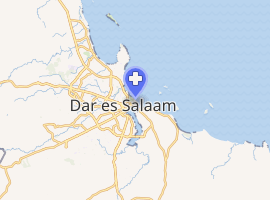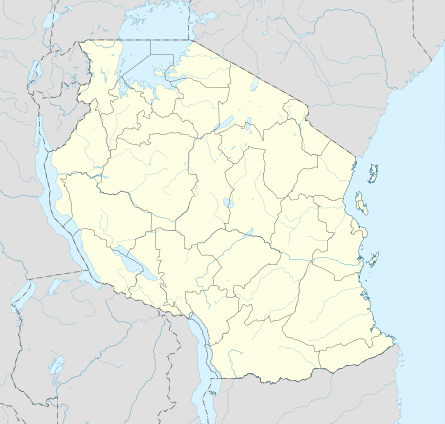Ocean Road Cancer Institute
Ocean Road Cancer Institute (ORCI) is a public, specialized, tertiary care medical facility owned by the Tanzania Ministry of Health and Social Welfare.[1] It is the largest comprehensive cancer center in the country.
| Ocean Road Cancer Institute | |
|---|---|
| Tanzania Ministry of Health and Social Welfare | |
.jpg) Ocean Road Cancer Institute, January 2017 | |

| |
 | |
| Geography | |
| Location | Dar es Salaam, Dar es Salaam Region, Tanzania |
| Coordinates | 06°48′39″S 39°17′47″E |
| Organisation | |
| Care system | Public |
| Type | Cancer Treatment, Research and Teaching |
| Services | |
| Beds | 259 |
| History | |
| Opened | 1895 |
| Links | |
| Website | Homepage |
| Other links | List of hospitals in Tanzania |
Location
The facility is located in Ilala District, in Dar es Salaam, Dar es Salaam Region, in Tanzania's capital and largest city. The geographical coordinates of the institute are: 6°48'39.0"S, 39°17'47.0"E (Latitude:-6.810833; Longitude:39.296389).[2]
Overview
ORCI is a cancer treatment, research, and teaching center, affiliated with the Muhimbili University of Health and Allied Sciences and with Muhimbili National Hospital, the teaching hospital of the university. ORCI maintains an inpatient facility with capacity of 256 beds.[3]
In Tanzania, an estimated 35,000 new cases of cancer were diagnosed in 2014, of whom about 21,000 (60 percent) died, the same year. The country has only two cancer hospitals, with the main one, ORCI, located in the capital, Dar es Salaam. Approximately 150 outpatients are attended to at ORCI, on a daily basis. At the institute, it is estimated that about 90 percent of the patients arrive when it's too late for a cure.[3]
History
This health facility was founded in 1895 by the German colonial government. In the beginning, the hospital catered exclusively for German community. After the First World War, the British Colonial government reserved the hospital for serving the European communities.[1]
After independence in 1961, the hospital was renamed the Ocean Road Hospital, and all racial restrictions were removed. Ocean Road Hospital became the maternity wing of Muhimbili Medical Centre. In 1980, the facility was converted into a cancer treatment unit. The Radiotherapy Unit of the Faculty of Medicine, University of Dar es Salaam was shifted from Muhimbili Medical Centre to the Ocean Road Hospital.[1]
In June 1996, Ocean Road Hospital was made an independent autonomous institute directly under the Tanzanian Ministry of Health and its name changed to Ocean Road Cancer Institute.[1]
In 2019, the hospital expanded its external beam radiotherapy services to include two linear accelerators in addition to its Cobalt-60 machine and brachytherapy services.[4]
Currently, plans are underway to install the first PET-CT scan in the country.[5]
ORCI also researches and treats viral diseases, including HIV/AIDS and Hepatitis B.[6]
International collaboration
The international organizations with collaborative projects with Ocean Road Cancer Institute include, but are not limited to the following:[1]
- National Cancer Institute: Bethesda, Maryland, USA
- International Atomic Energy Agency: Vienna, Austria
- World Health Organization, Geneva, Switzerland
- International Agency for Research on Cancer: Lyons, France
- Union for International Cancer Control: Geneva, Switzerland
- International Network for Cancer Treatment and Research: Brussels, Belgium
- International Association for Hospice and Palliative Care: Houston, Texas
- ICAP at Columbia University: New York City
- University of Copenhagen.
References
- ORCI (2018). "Background of Ocean Road Cancer Institute, Dar es Salaam, Tanzania". Dar es Salaam: Ocean Road Cancer Institute (ORCI). Retrieved 18 February 2019.
- Google (18 February 2019). "Location of Ocean Road Cancer Institute" (Map). Google Maps. Google. Retrieved 18 February 2019.
- World Health Organization (2015). "Shortages and late diagnosis hamper cancer treatment in Dar es Salaam". Geneva: World Health Organization. Retrieved 18 February 2019.
- https://www.ippmedia.com/en/news/%E2%80%98radiotherapy-equipment-orci-first-africa%E2%80%99
- https://allafrica.com/stories/202002040173.html
- Lamtey, Gadiosa (13 September 2018). "Ocean Road Cancer Institute Offers Hepatitis Screening". The Citizen (Tanzania). Dar es Salaam. Retrieved 18 February 2019.